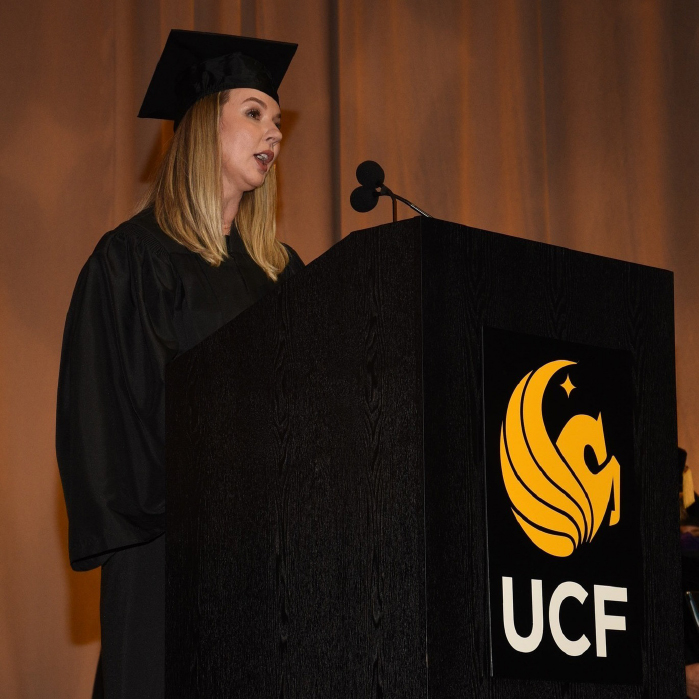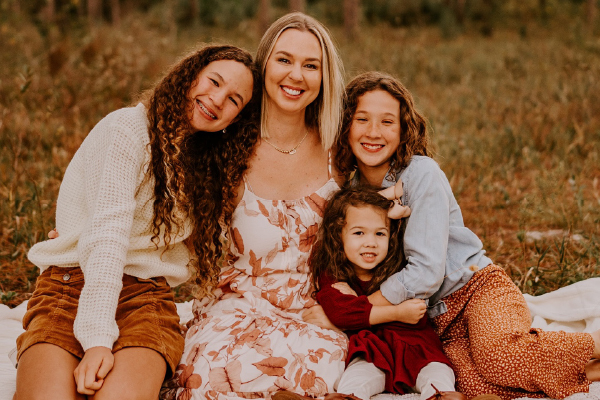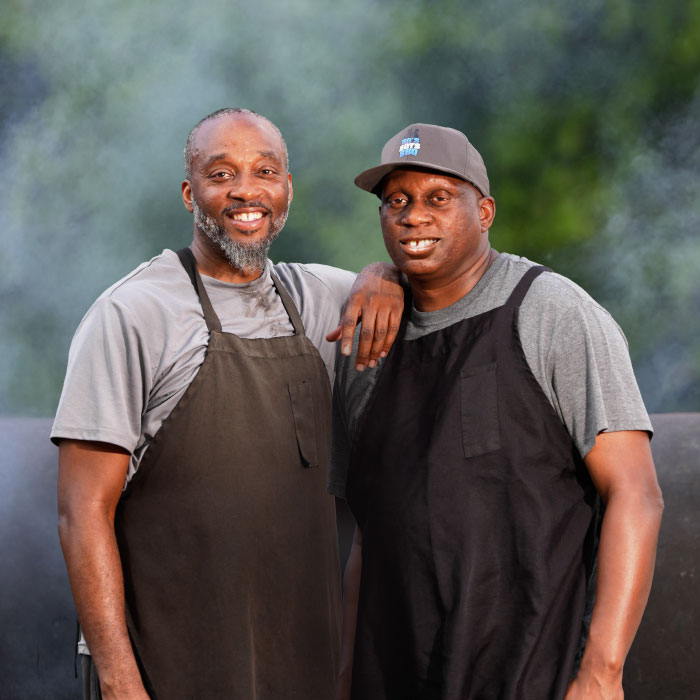Feature
Rising Up
A childhood marked by trauma shaped Jessica Villegas into a mentor who helps teens and families find hope, resilience and purpose.
- Kyle Martin
- Fred Lopez

Beaufort, South Carolina, a town where the air tastes of salt and the oaks bow under the weight of moss, isn’t where you’d expect a story of heartbreak and transformation to begin. But this is where Jessica Villegas’ life began, the daughter of teenagers barely older than the secrets they kept. Her mother, “15, maybe 16 already,” and her 21-year-old father approached parenthood not with joy, but with the weary detachment of people too young to carry such a heavy load.
“They liked the idea when it was easy,” Jessica says, her voice steady despite the ache in her words. “But mostly, they didn’t want the responsibility.”
Her childhood was a series of disjointed scenes—each more haunting than the last. Roach-infested efficiency apartments. Her mom homeless, sleeping in cars. Moving in the middle of the night. Drugs. Alcohol. Prostitution. Sexual abuse. Violence. An empty fridge. A father gone most of the time. The air heavy with absence.
By age 6, Jessica was a latchkey kid, walking herself across a busy street to an apartment that offered more loneliness than shelter. “I had to take care of myself. And them,” she explains. “I was the one who cleaned up after parties, nursed hangovers, or soothed bruises when they got hurt. I was more of a parent than they were.”
Jessica envied the other kids at school, with their new clothes, cupcake-laden birthdays, and moms who came to parent-teacher meetings. “I was a very sad child,” she remembers, tears welling in her eyes. “I just wanted to be normal.”
In ninth grade, the chaos shifted yet again. One morning, her father, who had no custodial rights, announced they were moving. No calls. No goodbyes. Just pack. They left South Carolina for Orlando, Florida, and for two weeks, things were as close to normal as they’d ever been. Jessica dared to hope things might improve.
Then the federal agents showed up.
Her father was arrested for arson—pouring gasoline over federal property in a fit of rage and setting it on fire. Her mother drove down to whisk Jessica back to Beaufort, where the details of her father’s crime splashed across newspapers. That summer, her mother admitted to a crack addiction and announced she was heading to rehab.
In the span of three months, both of Jessica’s parents were gone—not through death, but through the small, suffocating absence of addiction and incarceration—and she had become the kid other parents didn’t want their children around. She carried the weight of those judgments every day. “Nobody ever said, ‘Can I help you? Can we talk? I want to see you succeed,’” she says. “They just looked away.”
Jessica moved in with her grandmother, a devout Christian who replaced chaos with strict rules and rigid expectations. The sudden shift was too much. Jessica, overwhelmed by the weight of everything, attempted to take her own life. When she awoke 18 hours later, no one asked her why. Her grandmother grounded her instead, assuming she had snuck out the night before.

“I was the one who cleaned up after parties, nursed hangovers... I was more of a parent than they were.”
Building Her Own Foundation
Somewhere in those chaotic years—whether it was ninth or tenth grade is hazy now—Jessica found a sanctuary in the form of ballet. She’d taken a few classes as a kid, but back then, it hadn’t carried the weight of salvation. Now, with its ruthless precision and the demand for grace under pressure, ballet was a shield, a structure to contain the chaos.
“I just needed a way to not go home,” she says, marveling at the desperate ingenuity of her teenage self. Anything that kept her out of the house was fair game: school improvement councils, Students Against Drunk Driving, the African dance team (though, in the late-’90s in South Carolina, she was allowed to practice but never perform), and endless ballet classes. She worked at the studio, scrubbing mirrors and floors, teaching beginner classes, just to offset the cost of lessons her family couldn’t fully afford. Her grandmother paid what she could, and Jessica hustled for the rest.
It wasn’t just the physicality of dance that drew her in—it was the clarity. “It gave me something to control,” she explained. When everything else was unraveling, she could always fall back on pliés, on counting beats, on focusing her energy into mastering just one more move. In the studio, she wasn’t the girl whose home life was a mess. She was disciplined. She was worthy.
By the time Jessica finished high school, she had moved 27 times. College was meant to be her clean slate, a chance to start over. Her ambitions were bold, even if they lacked precision. “I wanted to be a news anchor,” she recalls. “Live in San Francisco. Walk to the grocery store. Have this sleek, urban life.”
A life that was worlds away from Beaufort. So, she saved up for a year and, in 2001, moved to Orlando. It was a sprawling, sun-soaked city that felt like a good compromise.
Her new Orlando life was a balancing act with no safety net. She took classes at Valencia, then transferred to UCF, working multiple jobs to stay afloat. She partied, married young, and had two kids by her early 30s. She switched majors endlessly—business, early childhood education, organizational communications—accumulating 365 credits before finally graduating in 2013. She was 32.
Her daughters were there to witness the climb. They watched her work late shifts, study at the kitchen table, and, finally, walk across the stage in her cap and gown. “That was important to me,” she says, her voice steady with pride. “I wanted them to see that life isn’t over because of setbacks. It’s about resilience.”
“Nobody ever said, ‘Can I help you? Can we talk?’ They just looked away.”
Sparking a Revolution
Jessica’s transformation wasn’t a roaring fire igniting in an instant. It was a stubborn ember, smoldering deep in the ashes. “I was lost for a decade,” she admits. “I didn’t know who I was or how to get where I wanted to go.”
But it caught—finally—at a bedside in North Carolina. Her grandmother was dying of lung cancer, frail and rasping but still full of something fierce. In one last gift, she spoke, her voice hoarse and deliberate: “Don’t ever let somebody tell you you can’t do something,” she said. “And don’t ever let anybody hold you down.”
That was the tipping point.
Jessica had heard her grandmother’s words before—versions of them anyway, sandwiched between half-truths and judgmental platitudes. The woman who taught her how to fold laundry just so, how to stretch a dollar until it nearly broke, was the same woman who allowed terrible things to happen. She hadn’t been an advocate, not for herself, and certainly not for her granddaughter.
And yet, those parting words landed with Jessica, at once a balm and a torch. The kind of paradox that sparks a revolution.
The beginning of Jessica’s revolution was the end of her first marriage.“He was abusive,” Jessica admits of the man who spent years trying to shrink her, hold her in place. When she left him, it was like stepping out of a shadow she hadn’t realized she’d been living in. “One of my final words to him before I left was, ‘I’m gonna do big things one day, and you aren’t gonna be part of that.’” She laughs now at the boldness of it, but back then, it felt like prophecy.
She talks about this new determination with a kind of reverence, not for herself but for the process. It’s not magic, she insists. It’s discipline and clarity and a refusal to let anybody hold her down. “I figured out who I am, who I am not, and where I want to go. And then I made it happen.”
Life had improved, but it wasn’t without its challenges. There were still bills to pay, a new marriage to navigate, a third daughter to raise, and a corporate job that offered stability but little satisfaction. “It wasn’t fulfilling,” she says with a shrug. “But it was safe. And for a while, safe felt like enough.”
What she didn’t expect was her “safe” logistics job becoming her masterclass in understanding people and systems. She found herself hiring young people fresh out of college, brimming with ambition but unsteady on their feet. Their backgrounds were impressive —pre-med, pre-law, MBAs—yet here they were, interviewing for entry-level roles. “It baffled me,” she says. “Their handshakes were timid, their resumes sold them short, and they couldn’t look me in the eye during an interview. It wasn’t just that they didn’t know how to advocate for themselves. They didn’t know themselves.”
So, she mentored them. She taught them to negotiate salaries, polish their resumes, and take ownership of their work. In doing so, she stumbled upon a truth about herself. The system frustrated her—its failure to prepare young people for the real world—but it also lit a fire within her.
By 2019, Jessica had risen to Director of Logistics and Procurement, managing complex events like corporate conferences and concert tours. On paper, it was the pinnacle of her career. She had the paycheck, the prestige, and a team she loved. But her soul felt starved.
“I remember sitting at lunch with my COO,” she recalls, “talking about this idea I had: a program to teach young people the basics of life. How to write a check, build a resume, nail a job interview. Things that seem so simple but are taught nowhere.” He encouraged her, but she knew the corporate world wouldn’t nurture her idea.
Then came 2020. The pandemic decimated the events industry and left Jessica without a job for the first time in her life—but the real blow was the loss of her team. “They weren’t just employees,” she says softly. “They were people I had mentored and protected. And suddenly, that was gone.”
During those grim months, the news from her community felt unbearable. Teenagers, overwhelmed, trapped in their own minds, ending their own lives. Each story punched her in the gut three times over; as a teenager who tried to take her own life, she understood that feeling of hopelessness; as a mother, she couldn’t fathom the devastation of that kind of loss; as a human being, she felt a rising urgency, a need to act.
She wanted to reach out, to grab these kids by the shoulders and tell them, “This pain isn’t forever. It doesn’t have to end this way. We can create a plan. You matter. You’re important. Let me show you.” Her past and present were colliding, creating a call she couldn’t ignore, an ache she had to answer.
An old idea began to whisper to her again. The life skills program.
Jessica started reading about ikigai—the Japanese concept of purpose—and found herself up late at night scribbling questions: What do I love? What am I good at? What does the world need? What can I be paid for? “What came out of it,” she says, “was that my purpose in life is to work with young people, one-on-one, to help them see who they are, how they can succeed, and how they can find happiness that’s truly aligned with who they are as people.”

“Life isn’t over because of setbacks.It’s about resilience. It’s about deciding to move forward, no matter what.”
Highlighting the Future
By the end of 2020, she was laying the groundwork for the program that would fulfill her purpose. She called her program HILITE. “I’d spent so much of my life transforming myself,” she reflects. “I wanted to help others transform too.”
For 15 months, she juggled her job and her growing obsession. By the end of it, she couldn’t stop thinking about what she was building. It consumed her, in the best way. “I knew the world needed this. And when you know something that deeply, setbacks don’t hit as hard. You just keep going.”
And on Jan. 3, 2022, Jessica stepped away from her steady paycheck and into the unknown. “I had two clients,” she says with a laugh, “but I believed.” That belief, along with her alignment with ikigai, became her anchor.
What she built wasn’t just a program; it was a lifeline for teens, young adults, and families floundering in the chaos of modern life. Parents called in desperation, their teens paralyzed by fear and self-doubt. And Jessica would meet them there—in the messy, imperfect middle of it all—and guide them toward something better.
“There’s a moment,” she says, “when a teenager realizes they’re not stuck. That they have choices. Watching that light come on—it’s magic.”
This isn’t some off-the-shelf curriculum cobbled together from a certification course. It’s hers—born out of her own hard-won experiences, shaped with care, and delivered with an undeniable sense of purpose. “Nobody does what we do, the way we do it,” she says. “And that’s why it works.”
And it does work. The impact has rippled outward like an earthquake, shaking loose old ways of thinking and making space for something new. Teens are learning to see themselves as more than their mistakes, more than their pain. Parents are finding hope in conversations they once thought impossible, learning to listen and be heard. Schools and studios began reaching out, eager to partner with her, to bring her work to their communities. And in a unique twist of fate, she finds herself speaking at both alma maters—in Beaufort and at UCF—standing in front of a room she once sat in, hoping to plant seeds of change in the next generation. “Young me needed the me I am today,” she says. “And maybe if more people step up, fewer kids will have to wait so long to find their way.”
The sacrifices—both financial and emotional—were enormous, no question about it. Building HILITE meant walking away from financial security, going into debt, and working long hours for little or no pay. It meant doing pro bono work and facing rejection after rejection.
But Jessica’s fire never dimmed. The grit and resilience forged from her chaotic childhood was given a new purpose. She thinks back to her teenage years—constant moving, endless instability, the heavy silence of feeling unseen. No one had stepped in then.
Now, Jessica steps in, pouring those hard-earned lessons into the kids and families she works with, offering not just tools but hope.
“I tell them to write it down: What do you want? What do you need to do to get there? How does this align with your values?” She pauses. “The thing is, most of them don’t even know their values yet. Nobody’s asked them.”
She wishes someone had asked her. Maybe her path would have been different. But she doesn’t dwell on regret. “Life isn’t over because of setbacks,” she says. “It’s about resilience. It’s about deciding to move forward, no matter what.”
That’s the fire she carries, the one her grandmother lit with those final words. It’s not just about finding her own way anymore—it’s about showing others that the power to change is already in their hands.
“Don’t let anyone tell you you can’t,” she says, her voice confident and steady. “Don’t let anyone hold you down.”









